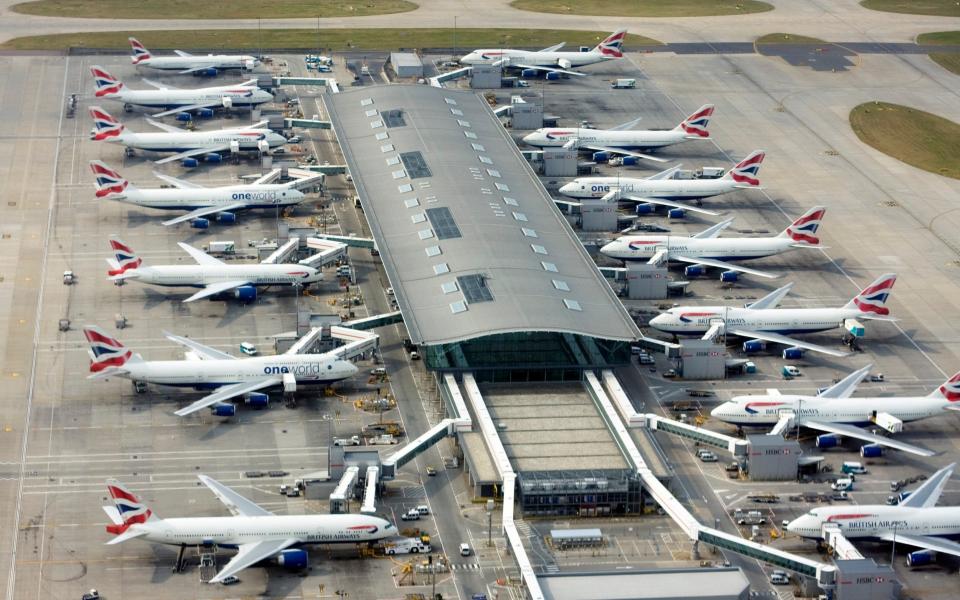Heathrow mulls legal action after being forced to cut passenger fees

Heathrow Airport is considering legal action after it was told to cut passenger fees by the regulator amid a row with airlines.
Passenger airport charges at Heathrow will fall by a fifth to £25.43 next year – but remain significantly higher than pre-pandemic levels.
Faced with huge losses as a result of the Covid shutdown, Heathrow had lobbied for charges to be increased to £40.
Airlines, meanwhile, demanded the charges were half of that figure at £20.
The Civil Aviation Authority (CAA) said on Wednesday that fees will remain at an average of £31.57 this year – in line with 2022 – before falling to £25.43 for the following three years.
Prior to the pandemic, Heathrow charges were £22.91 per passenger.
Heathrow is now understood to be mulling legal action against the CAA over the decision.
A Heathrow spokesman said: “The CAA has chosen to cut airport charges to their lowest real terms level in a decade at a time when airlines are making massive profits and Heathrow remains loss-making because of fewer passengers and higher financing costs. This makes no sense and will do nothing for consumers at a time when the CAA should be incentivising investment to rebuild service. We will now take some time to carefully consider our next steps.”
Heathrow and its airlines have repeatedly clashed as the CAA delayed its final determination.
Airlines claim Heathrow is already one of the world's most expensive airports and the main reason charges need to be increased is to service one of the UK's biggest corporate debt piles and allow dividends to be paid to its predominantly overseas shareholders.
The airport, meanwhile, has argued that it needs to increase charges to invest in vital upgrades to terminals and their facilities.
Willie Walsh, former British Airways chief executive and now director-general of trade body IATA, on Wednesday called for a “fundamental review” into Heathrow pricing.
He said: “The marginal improvement in the settlement shows we were right to push the CAA not to take Heathrow’s outrageous claims at face value. But let’s be clear, the CAA is still hostage to Heathrow’s pessimistic passenger outlook, and airlines and passengers will continue to pay one of the highest airport charges in the world.
“The UK cannot afford for this situation to continue if it wants to ensure a competitive level of charges that will benefit passengers and improve the connectivity of its only hub airport.”
Heathrow is owned by a consortium led by Spanish infrastructure firm Ferrovial, alongside sovereign wealth funds from Qatar, Singapore and China and pension funds.
Heathrow operates as a regulated monopoly, meaning its finances are controlled more like a water company. The CAA allows it to change its take-off and landing charges taking into account passenger forecasts and macroeconomic inputs such as inflation and growth rates.
The CAA said that its determination would allow for £3.7bn to be invested in Heathrow between now and the end of 2026. Investments would include switching all hand baggage scanners so that passengers did not need to remove laptops and liquids, as well as upgrading the baggage carousels in Terminal 2.
The airport faced an all-out revolt from some airlines last summer after it announced it would cap passenger numbers amid fears that the airport could be overwhelmed in the wake of extreme staffing shortages.
John Holland-Kaye, chief executive of Heathrow, announced in February he would step aside after nine years at the helm. It followed calls from airline bosses, including Sir Tim Clark, the British head of Emirates, for Mr Holland-Kaye to resign in the wake of the summer chaos.
Both airlines and Heathrow now have six weeks in which they can appeal to the Competition and Markets Authority over the CAA’s decision.

 Yahoo Finance
Yahoo Finance 